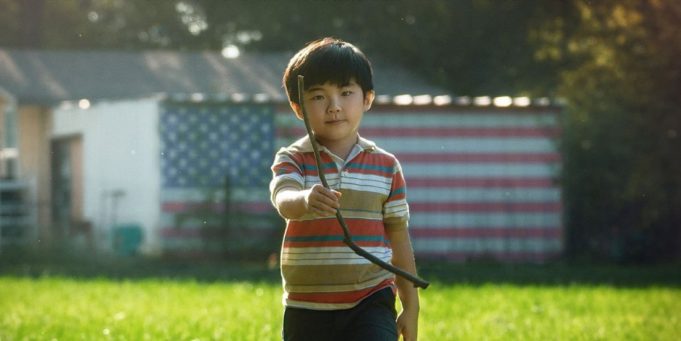With Parasite’s Oscar win last March, surely even the most sheltered moviegoer is aware by now of the great boom in Korean filmmaking since the beginning of this century. Some of those Korean entries have partially taken place in America, and some of the directors behind them have even made whole films here, but we haven’t yet had the great movie about being a Korean immigrant in America. For this, we needed someone like Lee Isaac Chung, a seasoned director of low-budget films about such subjects as terminal illness (Lucky Life) and Rwandan genocide (Munyurangabo). For Minari, he draws on his own life growing up as the child of immigrants in American backwaters, and it results in a deeply moving piece of work.
Steven Yeun stars as Jacob Yi, an immigrant in the early 1980s who fled the poverty of his homeland and saved up enough from his labors in California to buy 50 acres in northwest Arkansas for growing Asian vegetables to serve to the fellow Koreans who are coming to America after him. In the meantime, he and his wife Monica (Han Ye-ri) work as chick sexers — sorting baby chicks by gender at a factory, not an easy job — while their kids Anne and David (Noel Cho and Alan Kim) prepare to enter school. With all this work, the parents have trouble looking after the kids, so Monica’s mother (Youn Yuh-jung) comes over from South Korea to help out.
The movie’s title is the Korean word for an herb that has many names (water celery, water dropwort, Chinese celery, etc.) and a flavor akin to parsley, which is probably why it’s farmed in Italy. Grandma finds a creek in the woods near their house and plants large sections of minari along the banks, where the moist ground is perfect. The chain-smoking, hard-swearing old woman is a presence as hot as gochujang as she upbraids her daughter and son-in-law for using corporal punishment on the kids. Her gift to David when she arrives is a pack of cards: “Start learning early so you can beat those other little bastards at school!” The 73-year-old Youn has enjoyed a lengthy career in Korean movies and TV — maybe you saw her in the recent remake of The Housemaid, or on the Netflix show Sense8 — and she creates an indelible impression here as a grandparent with a uniquely peppery approach to kindness and compassion.
Much of the comedy here comes from the unlikely friendship between 6-year-old David and his grandmother, which is needed to cut the tension between the parents, as Monica chafes at living so far away from other human beings (especially other Koreans) and Jacob throws everything he has into making the farm profitable in the belief that success will smooth over all the problems in the marriage. These devout Christians have to join an all-white church because there’s no Korean church nearby, and a Korean co-worker (Esther Moon) advises them that the Koreans who live in the countryside want to get away from church. They hire a bedraggled white guy (Will Patton) to help on their farm, and he shows them a befuddling version of Christianity involving speaking in tongues and carrying a cross down the backroads. Much like Chloé Zhao does in Nomadland, Chung devotes much attention to the practical struggles of living off the land, as the Yis have to dig wells, drive long distances to find buyers for their produce, and deal with tornadoes, something that they don’t have on the Korean peninsula.
Without any big gestures, Chung manages by degrees to portray the process by which an immigrant takes root in American soil. In this regard, Minari is more successful than any such film since Brooklyn. The film ends with Jacob and David harvesting the minari that Grandma planted, and the big clouds of green foliage are a moving testament to a woman who was only in America for a short time but left a big, nourishing legacy behind.
Minari
Starring Steven Yeun and Han Ye-ri. Written and directed by Lee Isaac Chung. Rated PG-13.












